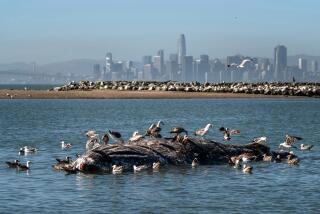THE TIMES POLL : San Diegans Favor Keeping Whale Shows
- Share via
SAN DIEGO — Despite last week’s death of a killer whale during a fight with another whale at Sea World, nearly two-thirds of San Diegans would like to see the park’s whale shows continue, a Times poll shows.
By a 3-to-2 margin, San Diegans also said they approve of keeping killer whales in captivity for amusement shows such as the one at Sea World, the poll found.
Conducted only six days after popular killer whale Kandu died as a result of injuries suffered when she attacked another female whale during a performance at the park, the poll found that the incident apparently has not dampened San Diegans’ enthusiasm for the shows or caused them to seriously question the shows’ propriety.
Favor Shows, Captivity
Sixty-five percent of those polled said they believe that Sea World’s killer whale shows should continue. Only 23% favor discontinuing them.
Asked for their attitude about keeping killer whales in captivity to be used in amusement shows, San Diegans approved of the practice, 44% to 28%, with the remaining 28% being undecided.
The Times poll is based on telephone interviews conducted Sunday of 860 people throughout San Diego County. The poll’s margin of error is plus or minus 5 percentage points.
With 72% of those surveyed saying that they have attended and enjoyed Sea World’s whale shows, the poll suggests that Sea World has a reservoir of public support that perhaps helped to mitigate the impact of the publicity generated by Kandu’s death.
“If you’ve been to Sea World and liked the shows, you’re probably more willing to look upon this as an unfortunate accident and not blame the park,” said Times pollster I.A. Lewis.
According to Sea World officials, the poll’s findings reflect the largely sympathetic public response that the park has received since Kandu died of hemorrhaging caused by a broken jaw sustained when she attacked Corky, a 7,000-pound female who outweighed her by about 2,400 pounds. Since the Aug. 21 accident, the park has received hundreds of telephone calls and letters, more than 80% of them positive, Sea World spokesman Dan LeBlanc said.
“Most people understand that animals are animals, and that what happened was an accident,” LeBlanc said. “We’re pleased this shows that this hasn’t affected the strong public support for what Sea World’s doing in terms of education and research.”
Others Dismayed
Some animal-rights activists, however, were disturbed by the findings, which one Greenpeace official described as evidence of “a lack of consciousness on this issue.”
“I’m frankly stunned by those numbers,” said Julia Tracy, a member of Greenpeace’s ocean ecology team. “It shows that most people aren’t aware what captivity means to orcas, because they’ve never had the experience of seeing them swim for miles in the wild. A lot more thought and questioning needs to be given to that.”
But a top official of the Animal Protection Institute said that she was encouraged by the poll’s finding on whether killer whales should be kept in captivity. While a sizable plurality of those respondents who have an opinion on the subject said they approve of the practice, 56% either disapproved or were undecided.
“I find that to be tremendously encouraging,” said Nancy Daves Hicks, the group’s East Coast director. “If you had asked the same question 10 years ago, I doubt you’d have found that 28% were opposed and 28% undecided. To me, this suggests that people are beginning to question whether 6,000-pound animals should be kept in captivity.”
Ongoing Debate
The comments from Sea World and the animal-rights groups capsulize a debate that began long before last week’s fatal accident.
On one side, officials of marine theme parks argue that displaying killer whales in captivity educates people--particularly youngsters--about the animals and perhaps even inspires some to become advocates for the marine environment.
Some marine biologists and animal rights activists, however, contend that keeping the whales in captivity makes them more aggressive toward one another.
“In nature, whales and other animals have the choice of either standing and fighting or running away,” Hicks explained. “In captivity, they don’t have that second option.”
Sea World officials, however, dispute that captivity played a role in the accident.
The poll revealed a gender gap in attitudes toward keeping killer whales in captivity, women feeling less favorably about it than men. While 51% of the men polled said they approve of the practice, only 36% of the women interviewed favor it.
Despite that difference, both sexes strongly favor the continuation of Sea World’s whale shows, with 67% of the men and 64% of the women expressing approval.
OPINION ON WHALE SHOWS Do you approve or disapprove of keeping killer whales in captivity for amusement shows such as the one at Sea World?
Approve: 44%
Disapprove: 28%
Don’t know: 28% Do you think the whale shows at Sea World should be continued, or should they be discontinued?
Continued: 65%
Discontinued: 23%
Don’t know: 12%
More to Read
Sign up for Essential California
The most important California stories and recommendations in your inbox every morning.
You may occasionally receive promotional content from the Los Angeles Times.










